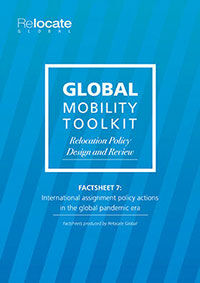Remote working: implications for talent management and global teams
Home and remote working are becoming increasingly common as requirements to socially distance, stay at home and undertake only essential travel become more prevalent as responses to reduce the impact of the Covid-19 pandemic. Dr Sue Shortland reports on the implications for managing mobile talent and facilitating successful global teams.

Home and remote working
To assist in the promotion of work-life balance it has been relatively common for employers to authorise homeworking where the job role enables this to take place successfully. Hence, homeworking has traditionally referred to when employees normally work on their employers’ premises but are allowed to work from home occasionally. As the pandemic has taken hold, more employees are working from home. This differs from traditional homeworking as this work arrangement has taken on a semi-permanent status, for example until Covid-19 infection rates decline and locations are not in some form of lockdown. As such, those engaging in home working have found themselves becoming “remote workers”.Remote working can encompass a range of different work situations. Traditionally it has referred to individuals who either work permanently from home or from a co-working centre (a non-company provided workspace). Remote workers may visit their employing organisation on an infrequent, occasional basis. Other forms of remote work include arrangements where employees can work from anywhere. Typically such workers might work in their employers’ premises, hot-desking for example when they are on-site. However, because their job role does not require physical presence on the employer’s worksite, they can opt to work in a location of their own choice. This could be their own home but also might be any other location.Related:
- Focusing on the family: Policy issues in the COVID-19 era
- Managing employee engagement during the pandemic
- What parents want from international schools in a pandemic
- Global tech vacancies bounce back from pandemic
Virtual assignments
In relation to global mobility, remote working is most likely to take the form of a virtual assignment. This might indicate a range of home/remote work options. For example, the virtual assignee might remain in their home country and deliver their work obligations in one other country – potentially in place of undertaking an international assignment of some kind (long- term, short-term, commuter, rotation, etc.). Alternatively, or even in addition to one primary host location work obligation, an assignee may remain at home and contribute to work duties and objectives across a range of different international locations.Remote working might also take place whereby the assignee is based in the host country, delivering work objectives for the host country operation (and potentially other locations as well), but works from their own host country home. There is also the potential for assignees to live in a third country (neither the home nor the host location) and again deliver their work remotely to home/ host/global business operations. Where necessary, and possible given Covid-19 restrictions, individuals might supplement remote working with business trips to home, host or third country employer premises.Clearly it can be seen that remote working opens up a plethora of issues for global mobility professionals. Looking beyond compliance (immigration and tax requirements), virtual assignments raise issues linked to talent management strategies and global team outcomes.Watch all of Dr Sue Shortland's most recent webinars:
Talent Management Strategy
Talent attraction and retention is critical to business success. The use of virtual assignments and other home/remote work arrangements can prove to be an attractive proposition to draw in individuals with valuable competencies. It can also aid organisations seeking to widen the diversity profile of their workforce with all the attendant benefits that diversity brings to the workplace.It is important to start by identifying which roles can be carried out remotely – some functions lend themselves more easily to this than others. Similarly with virtual assignments, it is important to identify the need for physical country presence and to determine whether assignees can be home country based but work globally or whether there is a need to be physically located in the host country but with the potential to work from home and visit the worksite when necessary.A third country location as a base might prove useful if assignees can work from home but are able to travel relatively easily between company sites as necessary across country borders (for example where countries are geographically close such as in parts of Europe). Of course, not all expatriate roles can be serviced virtually, so a talent deployment strategy using virtual assignments (supplemented as needed by physical presence) must take a realistic approach as to the effectiveness of remote work.Download the Factsheet: Relocation Policy Design and Review: International assignment policy actions in the global pandemic era to find out more about:
- International assignment types – options and trends
- Virtual assignments and remote working
- Cultural competence
- The employee experience, business flexibility and core-flex solutions
- Employee and family support and duty of care
- Compliance issues
- Further reading
A further factor to bear in mind concerns leadership and management attitudes to remote working. Line managers must be on board with any remote working talent management strategy. The relationship between an assignee/ employee and their immediate manager is critical to fostering employee engagement. Managerial guidance on carrying out a job role is also necessary for successful performance outcomes. Hence, it is important that if a remote/ virtual approach is to be used, management must be supportive of it and still be able (and willing) to provide guidance as necessary. This may require management training and development to identify how best to manage this aspect of the employment relationship.The organisation’s leadership must also sanction and support remote working in order to build an organisational culture that facilitates positive performance outcomes. In essence, it is crucial that there is alignment between senior leadership attitudes towards the use of remote working and its actual use. Mere toleration of remote work will not provide a supportive work environment; there must be top level support for it.In addition, it is critical to consider the implications of using virtual assignments or remote working for the management of local workforces. Expatriates traditionally take an active ‘being seen’ role in the assignment location, leading local workers conspicuously. Indeed, expatriates have traditionally reported that they find it difficult to strike a good work- life balance as they have to be seen to be carrying out their leadership roles, necessitating long hours of on-site working. If expatriates are working virtually, it is necessary to ensure that local workforces understand the leadership and managerial functions that virtual assignees are performing.This may need to be reinforced with training interventions and strong organisational communications.A further aspect that needs to be considered for virtual assignments as part of the organisation’s talent management strategy concerns the support offered via assignment policies. It is likely that traditional relocation policies that support long- term and short-term assignments will not be suitable for virtual assignees. It is advisable therefore to consider introducing a mobility policy that is tailored to the types of remote working being used in an international context.
Global Teams
Working remotely does not mean working alone. Today, individuals increasingly work as part of multi- functional and multi-cultural teams. Communication between team members is critical for creativity and high performance outcomes. Working remotely has therefore resulted in increased use of technology to enable conference calls and meetings to take place virtually.It is important to remember though that working virtually via technology is simply not the same as interacting face-to-face. Some 70% of communication is regarded as non- verbal. We pick up significant cues as to people’s understanding, meanings and acceptance/rejection of ideas from body language. While visual forms of online communication can provide access to facial expressions, we do not fully see all body language and nuances can easily be lost through time delays in transmission of pictures and speech.Cross-cultural communication is difficult at the best of times but it becomes even trickier without direct interaction. It is therefore suggested that cross-cultural training should be provided for those engaging in international virtual assignments. Indeed, global mobility professionals might wish to consider recommending cross- cultural communication coaching as this can be more personally tailored to individuals to help them improve their own communication styles when engaging in virtual work.Future Trends
There is unlikely to be a vaccine or treatment for Covid-19 in the immediate future and so we are likely to see the use of remote working and virtual assignments for a while to come. Indeed, 86% of participants in Air Inc’s “The future of remote work and Covid-19’s impact on mobility” survey reported that they expect to see an increase in remote work requests in 2021.Even if the pandemic is controlled such that there can be a return to the use of traditional international assignments, it is likely that employees may request to work virtually if they find this more enjoyable and suited to their personal circumstances and family lives. As such, global mobility professionals will need to think aheadand ensure that strategies for talent management, including assignment reward policy, and global team training and development are all in place for a potentially very different future mobility landscape.IT IS LIKELY THAT EMPLOYEES MAY REQUEST TO WORK VIRTUALLY IF THEY FIND THIS MORE ENJOYABLE AND SUITED TO THEIR PERSONAL CIRCUMSTANCES AND FAMILY LIVES.Enter the 2021 Relocate and Think Global People Awards - showcasing international management and mobility!
Subscribe to Relocate Extra, our monthly newsletter, to get all the latest international assignments and global mobility news.Relocate’s new Global Mobility Toolkit provides free information, practical advice and support for HR, global mobility managers and global teams operating overseas.
 Access hundreds of global services and suppliers in our Online Directory
Access hundreds of global services and suppliers in our Online Directory
©2026 Re:locate magazine, published by Profile Locations, Spray Hill, Hastings Road, Lamberhurst, Kent TN3 8JB. All rights reserved. This publication (or any part thereof) may not be reproduced in any form without the prior written permission of Profile Locations. Profile Locations accepts no liability for the accuracy of the contents or any opinions expressed herein.
































